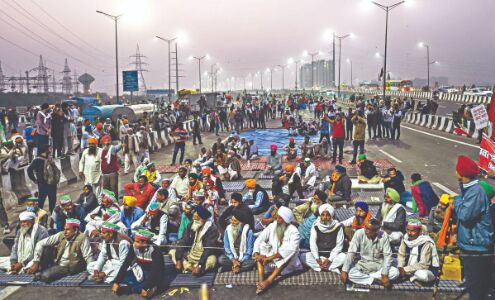Disagreement ≠ disobedience
Given India’s diversity, dissent amongst minorities has to be understood from the point of view of the dissident, and not just of those who hold majoritarian views

In an extremely charged environment, emotions and perceptions get the better of facts and legality. Societal issues are divided on partisan lines with opposing sides giving flexible justifications. Divided sections throw all sorts of logic at each other, including some, that awkwardly boomerang. Recent discourse on the farmers' protest is defined regrettably by few empathetic and civilised discussions and more accusatory and intimidating ones, which have further polarised society. With reckless name-calling and conflation of a self-declared civil movement to a religious/secessionist movement, the social consequences can be seriously wounding. Many people ignorantly point out and deny judicial judgements, observations and actions. However, invoking a simplistic understanding of law and the Constitution in order to deny people of their rights to raise concerns is morally and legally wrong.
The legacy of peaceful dissent has been bestowed to us by the founding fathers of our nation through the Civil Disobedience Movement during our freedom struggle. Mahatma Gandhi adopted protests as a means of expressing dissent by following the path of Ahimsa. It is equally true that the right to dissent does not extend to violence, desecration or destruction as it then crosses the rubicon. Therefore, it is imperative on both sides of the contention to isolate such elements from the larger issues.
One can slap the entire movement as harbouring malintent only when it seeks to defend wrongdoing or violence. But, in the farmers' protest, their undeniable patriotism is evident as they concurrently wave the tricolour and call upon the conscience of the nation. It is a sheer instigation to cast aspersions on their love for the nation. In a democracy, disagreeing with the law is fundamentally different from disobeying the law. The former is allowed and even necessary sometimes, but the latter isn't.
Recently, popular conscience was shaken by a clearly insensitive and retrograde ruling by a Judge, that groping a minor's breast without 'skin-to-skin contact' was not a sexual assault. In this specific case, till the Supreme Court intervened, the legality of the ruling stood irrespective of what the sections of society thought. But to disagree and dissent with the ruling, is not only legally and constitutionally allowed, but also necessary from a humane perspective. Secondly, the context of the 'larger view of the society/nation' may be used to deny dissent by trying to stifle a minority opinion, but this amounts to majoritarianism and not democracy. It is a reality that progressive laws emanate from challenging the well-accepted norms of society. Only when a discomforting level of 'whys' are asked, the society actually changes. As an example, till very recently, the laws governing homosexuality (Section 377) were dictated by a British era legislation of 1861. Presumably, there wasn't enough societal support to revise laws that were based on norms over 150 years ago, yet it took a minority section to challenge the majoritarian thinking. So, to argue that a movement like the farmers' protest is not reflective of farmers across the country (it may or may not be so) is irrelevant. What matters is the right to peacefully disagree.
The principle of dissent or disagreement is allowed within the ambit of law itself. In many cases, the disagreement of one or more judges against the majority view of the bench is called dissenting judgement. These dissent statements often become the bedrock of persuasive reasoning and argument for a subsequent revisits to the matter on hand. It was the courageous and minority voice of dissent by Justice HR Khanna in the habeas corpus case against Indira Gandhi's Emergency which had sought the fundamental rights to be suspended. It took another 41 years for the same to be upheld as a fundamental right under the Constitution. More recently, Justice DY Chandrachud's dissenting note on the Aadhar judgement that it amounted to fraud and illegality, was also a minority dissent initially. Society is often served better by the courageous dissent of a few, even when the majority disagree. This healthy and necessary dissent within the legal sphere is also an extension of the constitutional right to dissent.
There is another false perception amongst many people that disagreeing with the legal provisions amounts to contempt of court. For a civil or criminal contempt, the operative expressions are 'disobedience of any judgment' or 'scandalising the court with obstructions, interferences and prejudices to any judicial proceeding' — and not just by expressions of mere disagreement. If anything, as the guardians of the Constitution, the courts cannot be thin-skinned but be considerate enough to demonstrate the highest traditions of 'majestic liberalism'. Former Supreme Court Judge, Deepak Gupta noted against the recent trend of questioning various institutions to be equivalent to sedition, saying "criticism of the executive, the judiciary, the bureaucracy, the armed forces cannot be termed sedition". Most importantly, he had cautioned, "If we stifle criticism of these institutions, we shall become a police state instead of a democracy".
Given India's diversity and inequities, a certain disaffection, particularly amongst the 'minorities' (of religion, caste, occupation or even opinions) needs to be generously harmonised, entertained and allayed — not necessarily by acceding to all demands always, but certainly by dignity, honesty and sparing ridicule. The sincerity of such attempts has to be understood from the point of view of the disaffected, and not just of those who hold majoritarian views. In the specific case of the farmers' protest — irrespective of the merits for and against the farm laws — the disagreeing party is the protesting farmers. They are subjected to a powerful counterforce. Their disagreement deserves to be dealt with sensitivity and dignity.
The writer is a second- year law student. Views expressed are personal



